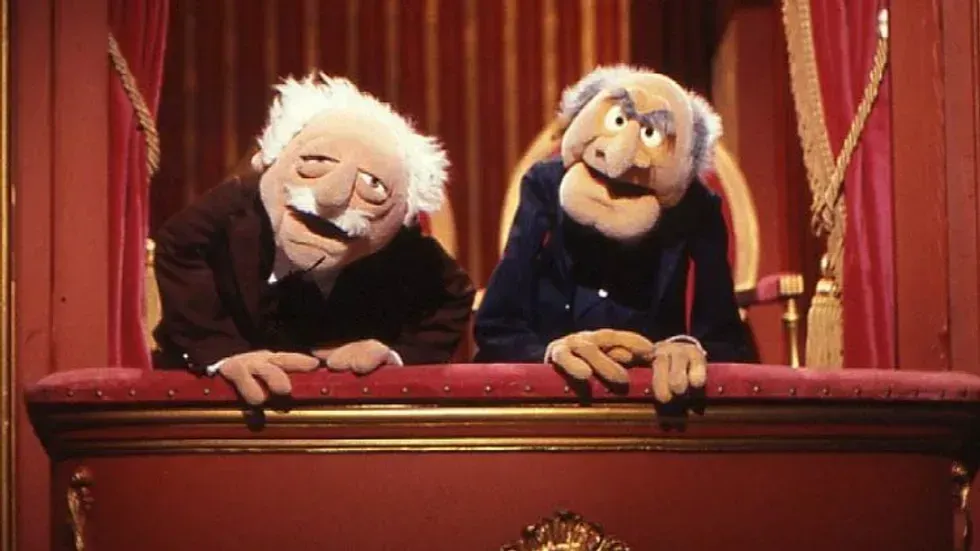Reviews: Old Times, Rainbow on Mars, SummerWorks
The summer season winds down with some Pinter, some performance art and the announcement of a new monthly sketch series
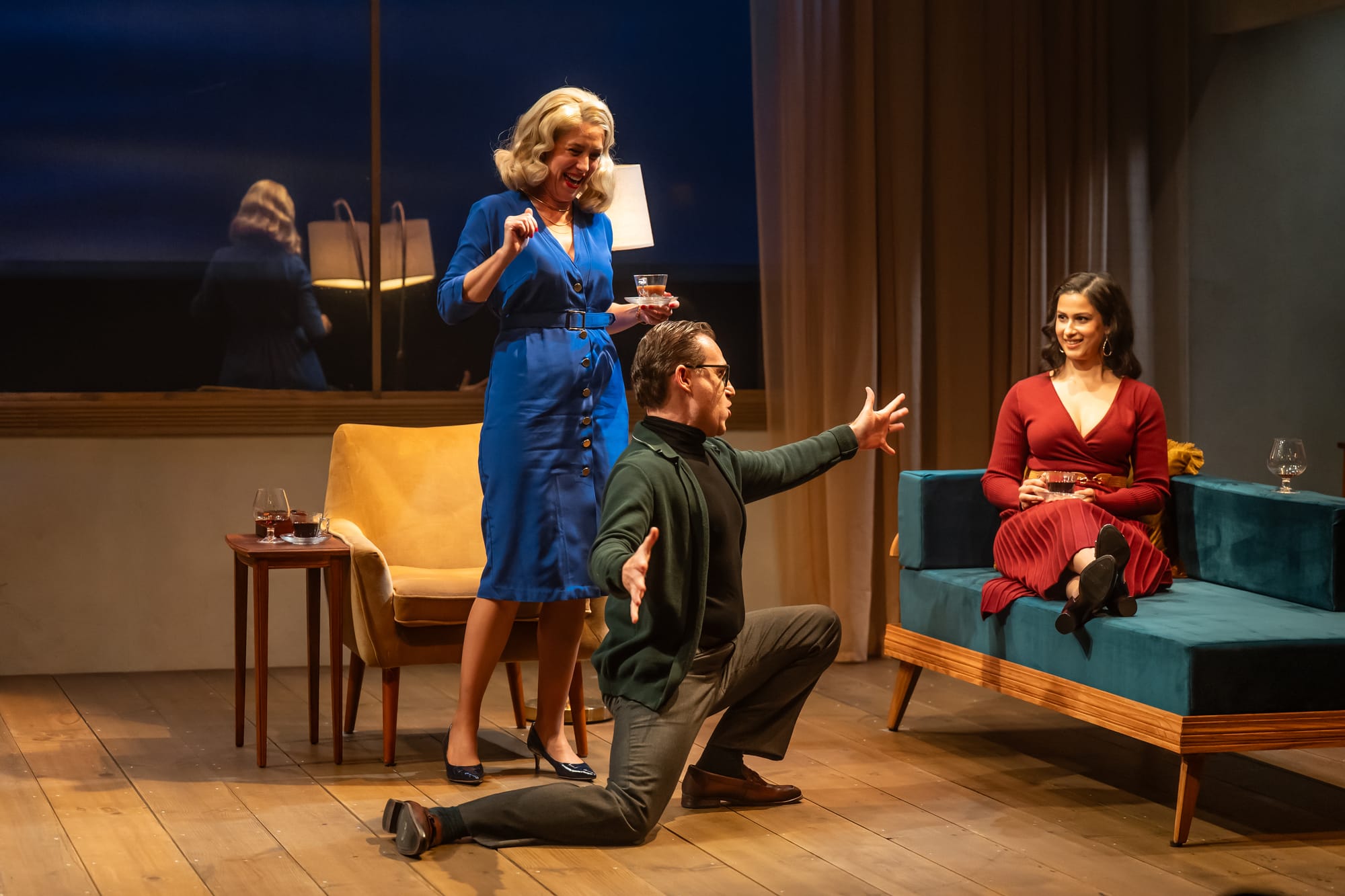
Have your theatre-going habits changed in the past few years? I only ask because last week at a SummerWorks show (see my capsule reviews below), I ran into my friend Eleanor, whom I used to see at least two or three times a month at shows.
In the before times, we would always compare notes about what we’d seen and enjoyed, and what we were looking forward to. And she told me she hadn’t been seeing as much since the pandemic. I’ve only seen her maybe once or twice in five years.
Anyway, it was lovely to briefly catch up and talk about the fall season with her — she even reminded me of a play related to the one we were seeing, which brought back lots of memories.
But it got me wondering if there were other former frequent theatregoers out there who have cut back, and how that might be affecting the current theatre climate.
Speaking of the past, and memories, and friends, go see Peter Pasyk’s bracing, invigorating revival of Harold Pinter’s Old Times (Rating: ✭✭✭✭) over at Soulpepper. It’s one of those plays that has a deceptively cool and calm surface that contains depths we’ll never fully uncover.
The set-up is simple enough. Successful filmmaker Deeley (Christopher Morris) and his wife Kate (Anita Majumdar) live in a remote English farmhouse. They’re expecting a visit from Anna (Jenny Young) who, unbeknownst to Deeley, once roomed with Kate in London but now lives in a villa outside Sicily.
When Anna shows up, more is revealed. The two women talk about how they used to spend their time in swinging London; Deeley, meanwhile, reveals how he met Kate at a screening of the Carol Reed film Odd Man Out — a title that Pinter has obviously chosen for its symbolic connotations. Who’s the odd man — or woman — out in this play we’re watching?
Soon enough, stories begin contradicting each other. Have Deeley and Anna met before? One believes so, the other doesn’t. Details recur in a fascinating, dreamlike fashion. If you enjoy puzzle movies like Mulholland Dr., you’ll probably find yourself pulled into Pinter’s world of psychological games and slippery truths.
Pasyk, his design team and fine cast — hard to believe Majumdar and Young, both experienced thespians, are making their Soulpepper debuts — tease out the fascinating ambiguities in the script.
I particularly like how moments bleed into each other, without being overly fussy. Flashbacks seem to occur in mid-scene and then we’ll snap back into the present. Characters have their back to you, not really there, and then turn around and join in the conversation. (This isn’t as easy as it sounds; the timing has to be perfect.)
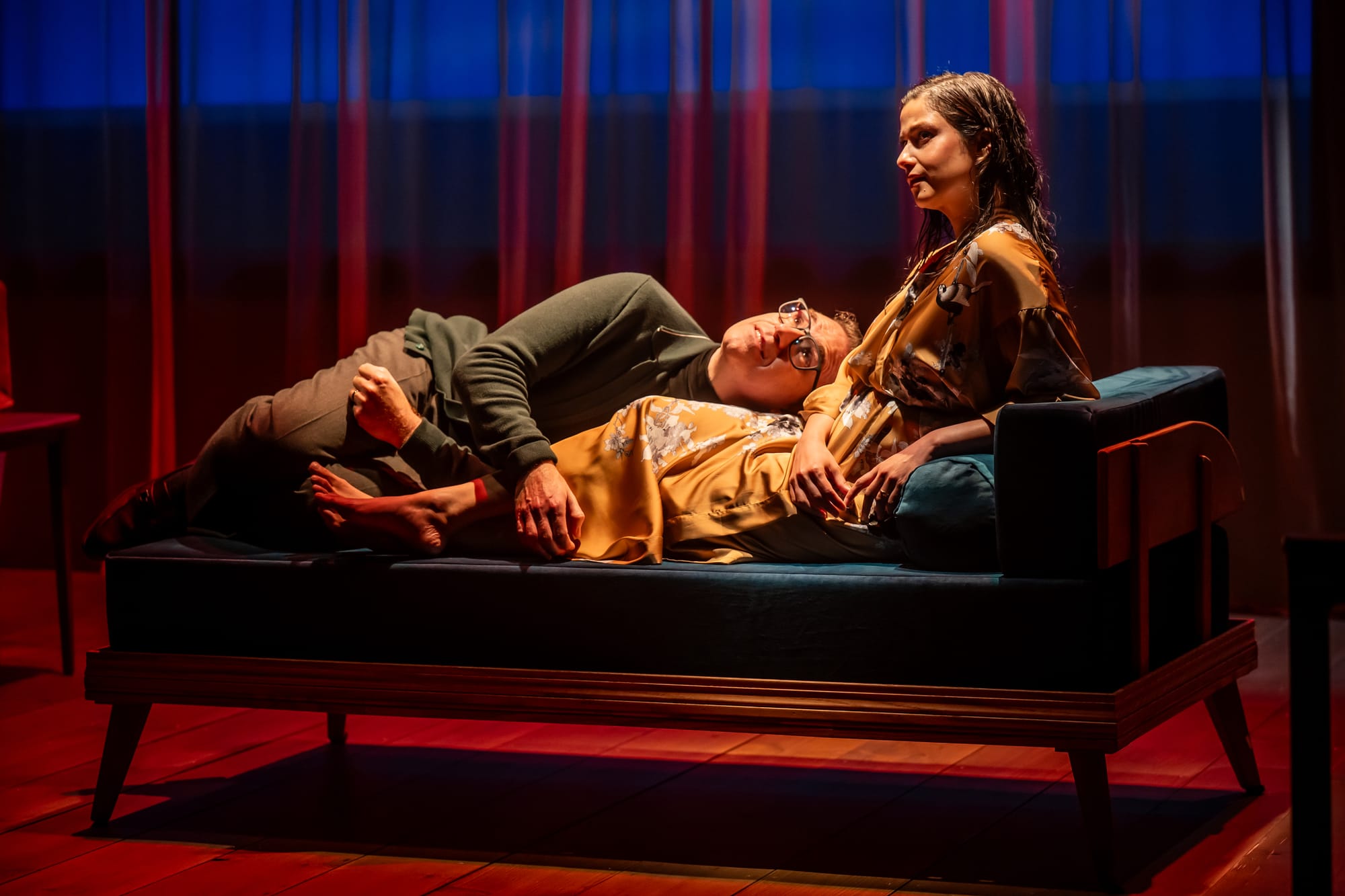
During one of the play’s most famous sequences, as Deeley and Anna serenade Kate with a medley of lyrics from old standards, the line “Oh how the ghost of you clings” stands out. Indeed. This is essentially a ghost story. But who’s died? Who’s alive?
A play like this must be handled with precision, and you can see and feel that in every inch of Snezana Pesic’s spare set of tasteful mid-century modern furniture and the primary colours of the women’s dresses — further making this feel like a bizarre game. Jacob Lin’s sound and Imogen Wilson’s lighting are subtly effective.
All three performers handle the micro-aggressions and shifting power dynamics of Pinter’s script with skill. Morris’ snide, sarcastic lines clue us in early that things aren’t as they seem, while Young invests Anna with a cheerfulness that masks aggression.
Majumdar, whose cleansed, newly robed and slyly satisfied final image gives us a clue as to who the last person standing might be, has never seemed more beguiling.
Make sure you leave time to compare notes about the play afterwards with friends or other audience members. The production warrants it.
Old Times continues at the Young Centre’s Michael Young Centre (50 Tank House Lane) until September 7. See info here
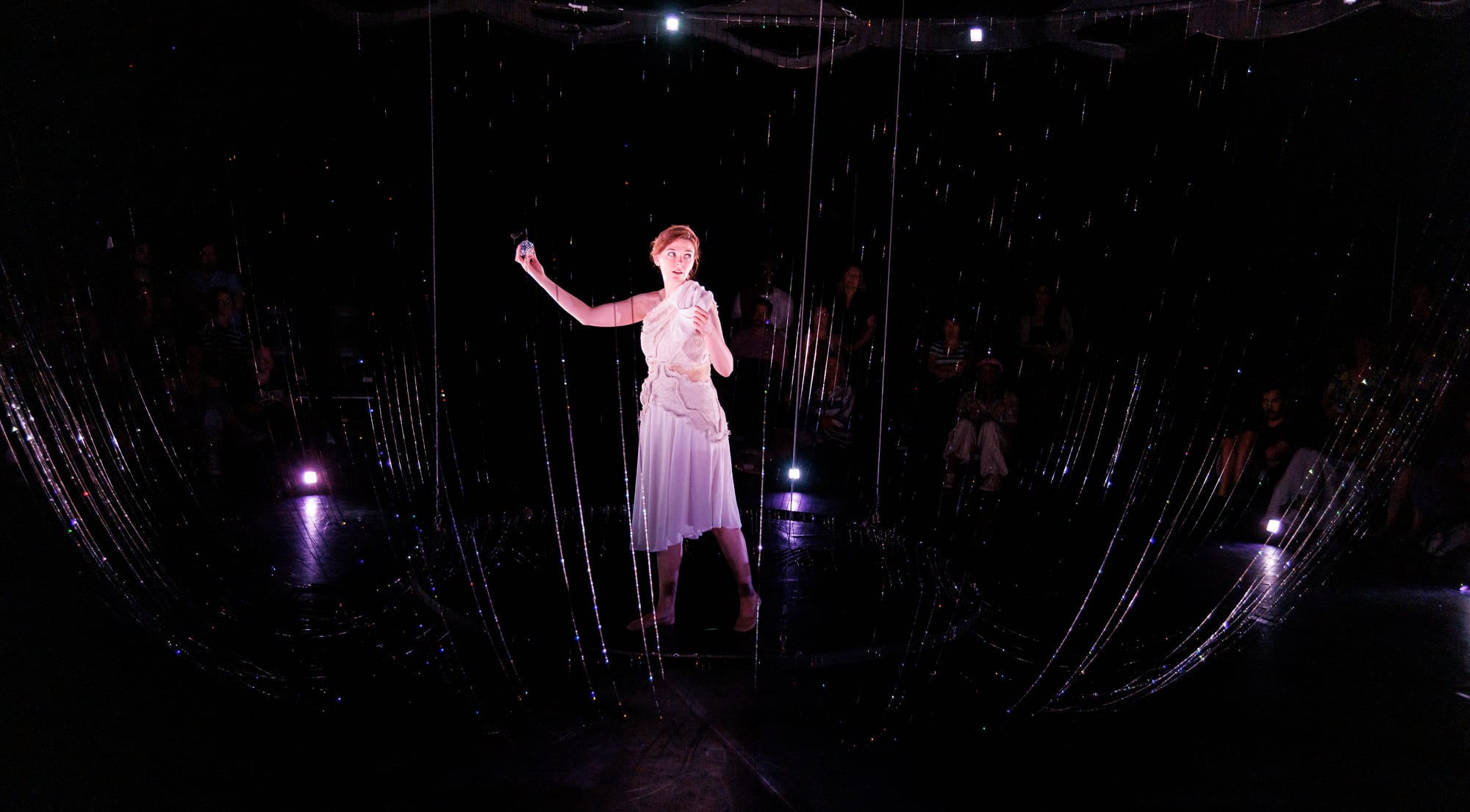
Strained metaphor
Devon Healey’s Rainbow on Mars (Rating: ✭✭) is being billed as a “multisensory dance theatre experience,” which I suppose is true. It appeals to various senses. There are dance elements, as well as theatre ones. And it is an experience of sorts, although at two-and-a-half hours, a rather tedious and repetitious one.
But unfortunately the narrative at the centre of the show — the iris, as it were — seems vague and ill-thought-out. Even its themes feel — to borrow a word from the world it tries to create — “squishy” and amorphous. Despite all the elements in this co-production between Outside the March, The National Ballet of Canada and Peripheral Theatre, I’m not convinced Healey really knows what she wants to say.
After emerging from a cocoon-like sheath (the detailed costumes are by Anahita Dehbonehie), Healey’s Iris, like Alice before her, encounters a group of disparate characters in an unusual world. Dark lab-coated scientist types poke and prod at her eyes, testing her like optometrists from hell. A bunch of “techies” look like they’ve flown in from the set of some Terry Gilliam film. And once Iris escapes to a forest, she encounters a group called the “sads,” as well as a harlequin figure named Lynk (co-director Nate Bitton) who has one eye and can straddle various worlds.
Throughout it all, we hear a voice (Vanessa Smythe) simultaneously narrate what’s going on — perhaps to aid Blind audience members — and give us stream-of-consciousness access to Iris’ inner thoughts. Smythe handles this difficult role skillfully, but there are diminishing returns as the latter part of the show descends into chaos.
At some point Iris loses her “device,” a hand-held bit of technology that glows various colours and that other people seem obsessed with. It’s an obvious metaphor for society’s over-reliance on smart phones. Instead of finding it, Iris is given another portable item that she calls “the squishy,” or something like that. What it does — and why it’s in the show — never becomes clear.
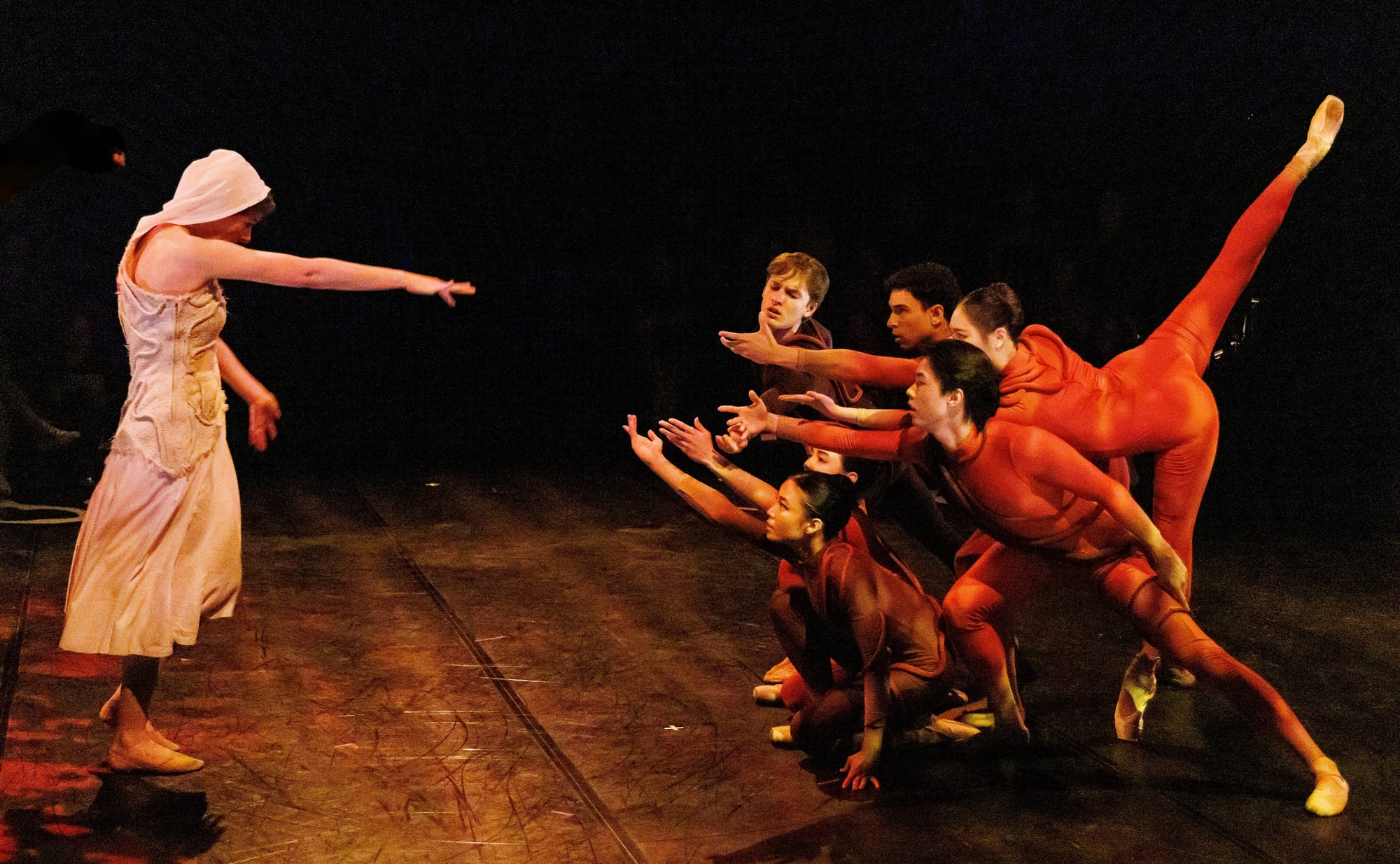
Apparently the work is inspired by Healey’s journey into Blindness. That’s commendable. And indeed, the first couple of scenes suggest a disorientation that is disturbing and palpable. But unlike Lynk, who gives us a story about how he lost one of his eyes, we know nothing about Iris’ earlier life. Why resort to metaphor and some dystopian setting when the details aren’t clear enough?
As well, sensual elements in the pre-show that are meant, perhaps, to evoke Iris’ journey — like hanging bits of fabric in the dark walkway leading to the main playing area — seem perfunctory.
What we’re left with is a work with some fine production values. Nick Blais’ set and costumes, teased in a walkway from the lobby to the large Ada Slaight Hall at Daniels Spectrum (Q: Why isn’t this venue used more frequently?), is dominated by a large, shimmery chandelier/web that descends from on high to signify... something. The techie-mobile has been crafted with care. Dehbonehie has ensured that each group of characters — including an ensemble of apprentice dancers from the National Ballet, executing choreographer Robert Binet’s swirling moves — has a distinct, carefully curated look. And Heidi Chan’s sound design and compositions envelope the space in an effective way.
But for a production that purports to give us a multi-sensory experience, and one performed by artists with — and I’m quoting the show’s own description here — “various expressions of Blindness and sight,” whatever that means, the production feels both under-written and over-produced.
Also: why Mars?
Rainbow on Mars continues at the Ada Slaight Hall, Daniels Spectrum, 585 Dundas East, until August 20. See info here
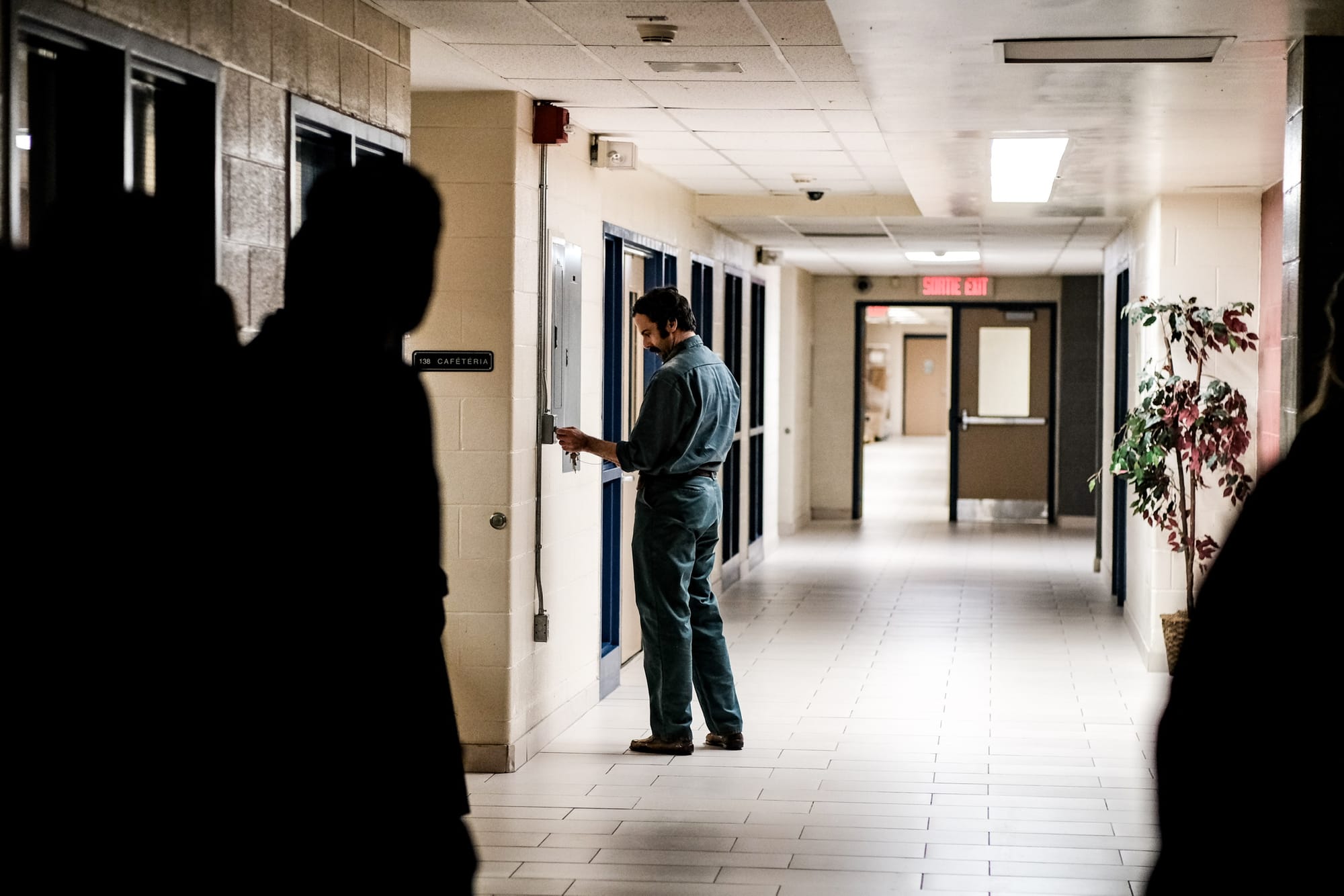
SummerWorks x3
I always enjoy SummerWorks, which just wrapped its 35th edition over the weekend, because it features the kind of works you don’t normally see during the rest of the year. Full of experimental, outside-the-box pieces, it’s the anti-proscenium theatre festival. Anything goes. Just come with an open mind.
That certainly helped with Le Concierge (Rating: ✭✭✭✭), Vincent Leblanc-Beaudoin and Daniele Bartolini’s walkabout piece performed at Saint-Frère-André Secondary School in the west end.
After meeting in the school’s staff room and donning reflective vests, a small group of audience members — told not to talk — follows Izo (Leblanc-Beaudoin), the school caretaker/janitor, as he mops floors, puts up chairs in classrooms and scrubs toilets and urinals.
It’s repetitive, lonely, taxing work, one room pretty much like the next. Music from a boombox helps break up the monotony. So does occasionally looking out a window. But the work must get done. The clock is ticking. (Many of the clocks in the rooms have been adjusted to make it feel like it’s the middle of the night.)
Occasionally, we get glimpses into Izo’s inner life as he pauses over the digital image of an Edward Hopper painting in a science lab, for instance, or stares questioningly into a bathroom mirror. During a break, we visit his inner sanctum, a private room in the bowels of the building. Items in a box — presumably from some ancient lost and found room — bring him, and us, some unexpected joy.
Any easy sentimentality is quickly washed away, however, in the next few episodes where, instead of just being passive observers, we enter Izo’s world and get down to business ourselves. See more info here.
There’s lots of participation, too, in The Chains (Rating: ✭✭✭), Evan Webber’s intriguing script reading/personality quiz/performance piece produced by Public Recordings.
The work is divided into two parts. The first consists of a 50-minute test in which people at a table read aloud from a work narrated in the second-person singular about teens living at the beginning of this millennium. At the end of each section, all the participants at the table must answer a question.
When the entire work has been read and all the questions answered, users from the various tables add up their scores and are then divided into one of four groups representing characters from Sophocles’ play Antigone.
In the second part, they then act out bits from the play, posing some of the questions from their quizzes.
The main text — the words read out in the sub groups — is a little oblique and hard to summarize. The questions at the bottom of each section don’t always have much to do with the text itself.
But dividing the entire audience into four groups representing A) the principled Antigone, B) the group-minded chorus, C) the competent/hard-nosed administrator Creon or D) the Later-Antigone (someone whose stance changes after she’s been punished) is fascinating. It’s especially fitting for these fraught times.
Webber, who leads the exercise, ends the piece with a symbolic, communal gesture that is oddly reassuring and hopeful. See more info here.
The last SummerWorks show I caught, produced by South Korea’s Baram Company, was intriguingly called 유령들의 대화: 축제 The Ghosts Chat: What is a Festival? (Rating: ✭✭✭).
The ghosts in the title are a Mengkkongee (a digging frog), a Sancheoneo (Cherry Salmon), a Butterfly and a Canada goose, all evoked with charm and character by creator/performers Nara Kim and Yii Lee.
Pollution and climate change have radically altered these creatures’ worlds; there used to be 80,000 Mengkkongee in the river, for instance — and, in a lively bit of audience participation, we recreate their sounds in the theatre.
But their numbers have plummeted. The salmon, raised in a fish farm, enters the river and expects to be able to swim to the ocean. The goose explains the intuitive way she joins a V formation with other geese, but without her friends seems lost.
The title doesn’t refer to the SummerWorks festival, but rather a familiar ritual that takes on a sinister new meaning in the context of the show.
The result, ably directed by Yunmi Han, is a likeable, family-friendly ecology/biology lesson thinly disguised as interactive theatre. See more info here.
Sketchy surprise
If you like sketch comedy, I’ve got some good news. A new monthly series has just been announced called Spotlight at The Second City. It will platform two sketch troupes each performing 30-minute sets for a two-night run.
“It is a rare opportunity for sketch troupes to perform their feature length shows more than once outside of the festival circuit,” said Taylor Hreljac and Gabe Meacher, who are hosting and producing the show.
“We partnered with The Second City to create this monthly show where established and emerging sketch troupes... can show their best stuff to industry and audiences on a professional stage.”
The first two acts have been announced: award-winning troupes Potato Potato and Small Friend Tall Friend. I’m not familiar with the first troupe, but I loved the second when I saw them a couple of years ago at the Toronto Fringe. (It looks like the group now has four members instead of five.)
They will perform at the series launch on September 2 and 3 at the Second City’s Theatre ’73. Later shows take place monthly until December — you can check out the exact dates here.
I’ll be reviewing the monthly shows over at Parton & Pearl. I can’t wait; one of the things I most miss about my old job at NOW is covering the Toronto comedy scene, which has never got enough attention from mainstream media.
I’ll link to my reviews here when they’re posted.
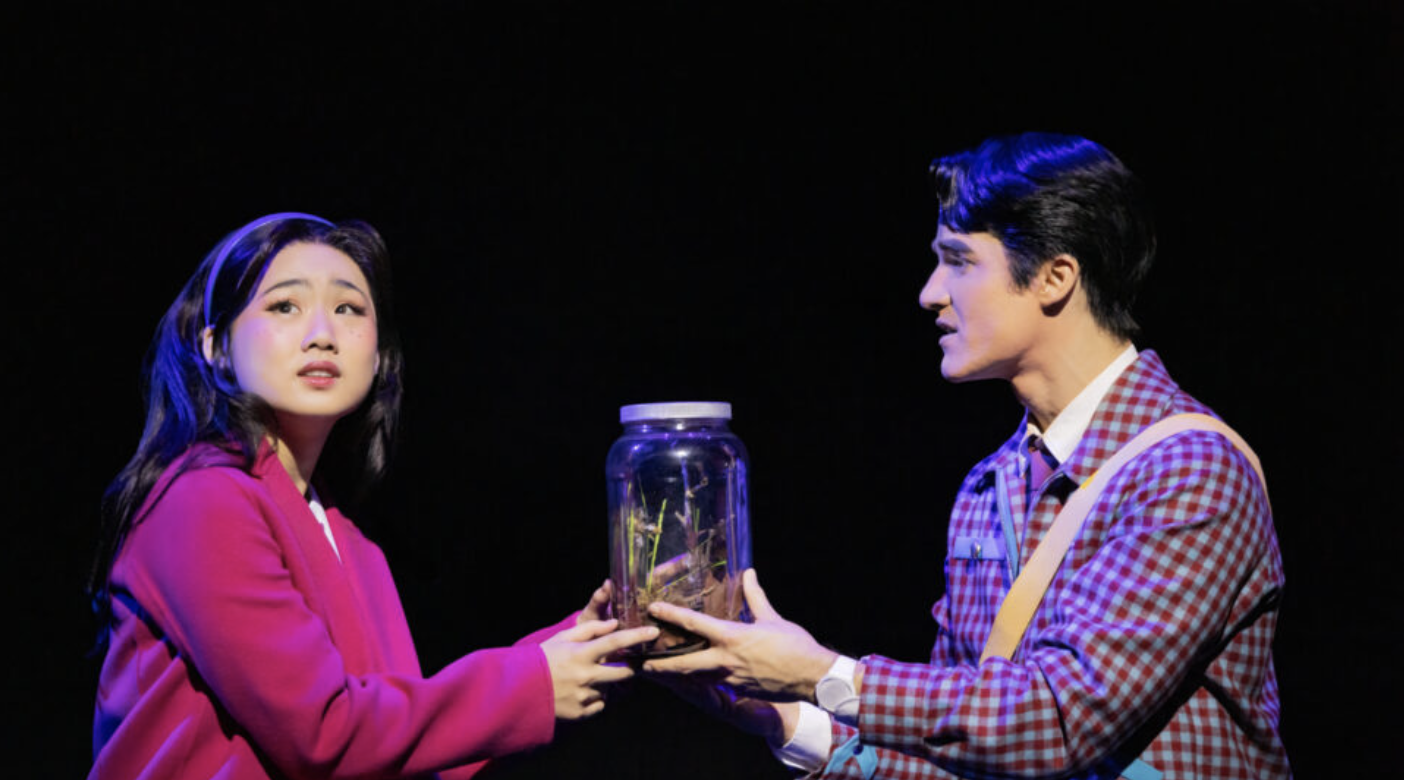
Maybe Awkward Ending
A couple of months ago, the theatre world rejoiced when the South Korea-set show Maybe Happy Ending won the Tony Award for best new musical, and Darren Criss became the first Asian actor to win the Tony for best lead actor in a musical.
Then a few weeks ago, the producers of the show announced that Andrew Barth Feldman, who’s not Asian, would be replacing Criss in the lead role of Oliver, a helper robot, for a nine-week stint beginning in early September. (Barth Feldman is also the current boyfriend of Helen J. Shen, the female lead, which should add some dramatic appeal.)
Controversy ensued, especially among Asians in the theatre world — like BD Wong, who broke barriers himself as a Tony winner for the groundbreaking play M. Butterfly, and Conrad Ricamora, who was nominated for a Tony this last season playing Abraham Lincoln in Oh, Mary! Shen seemed caught in the middle.
The musical’s creators responded by saying that while they aimed for the show to be accessible to Asian performers, they did not intend for the robot roles to always be cast as such.
Toronto Star arts critic Joshua Chong and I discussed this topic recently on CBC Commotion with Elamin Abdelmahmoud, guest hosted by my friend and former NOW Magazine colleague Radheyan Simonpillai.
You can find that lively conversation here.
Picky Stageworthy interview
I’m glad that Phil Rickaby’s long-running theatre podcast Stageworthy has returned after an extended break. His recent conversation with playwright Evan Bawtinheimer, who won a Dora Award for his play Patty Picker back in June, was excellent, with lots of insights about story ideas, mental health, producing and (especially) the craft of writing. You can find the conversation here. (Rickaby also recently chatted with the Globe and Mail’s Theatre Reporter Aisling Murphy.)
Upcoming: Shakespeare x3 (from Shakespeare in the Ruff, Guild Festival Theatre and The Foster Festival); another report from the Stratford Festival; two indie productions; and more.

